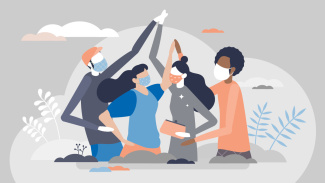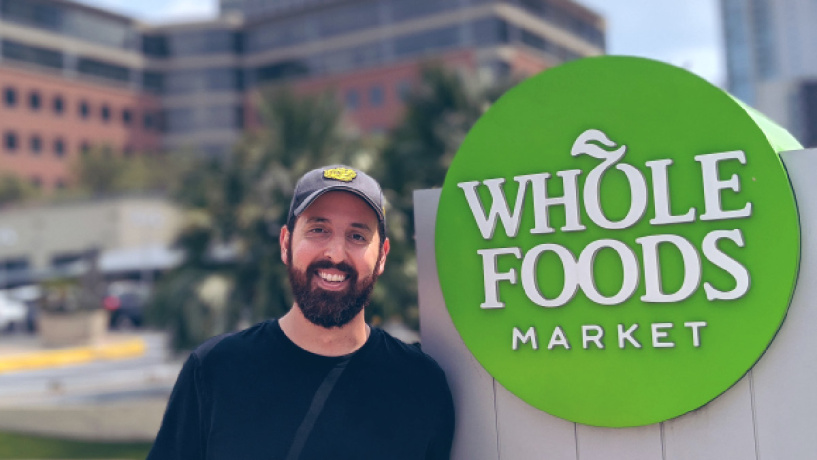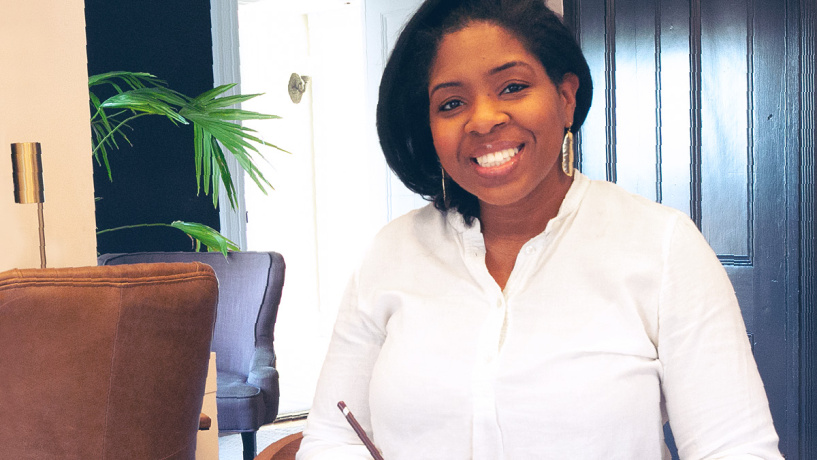A Catalyst for Impact: Michigan Ross Community Steps Up in Response to COVID-19 Pandemic

Beyond the immediate health crisis, the COVID-19 pandemic has caused countless unique challenges. As a testament to the strength and character of the community, alumni, students, faculty, and staff of the Ross School of Business have stepped up to lead and support those in need since the outbreak of the virus.
From the front lines of healthcare to their home offices around the world, the Ross community has responded to the pandemic by viewing its challenges as opportunities to create a positive impact. Here is a snapshot of what community members have done and accomplished.
Alumni take the lead
In the healthcare space, Michigan Ross alumni have been leading efforts to confront the ongoing health crisis. That includes Betty Chu, MBA ’13/MD ’95, senior vice president, associate chief clinical officer, and chief quality officer at Henry Ford Health System, who has been at the center of the emergency response plan the health system has used to effectively manage the crisis in metro Detroit.
Alumni also lead companies that are involved in the creation of COVID-19 tests and vaccines. Among them are Jeff Williams, MBA ’92, CEO of NeuMoDx Mollecular Systems, which is developing a real-time test capable of providing results in just over an hour; and Choon-Peng Ng, MBA ’04, co-founder and CEO of ImmunoScape, a biotech firm that has partnered with other organizations and research groups to develop a vaccine candidate soon beginning trials in Singapore.
To support the front-line healthcare workers, alumni groups have come together to provide personal protective equipment to hospitals. After living through the worst of the crisis in their country, around 100 members of the Michigan Ross Chinese Alumni Association helped bring Michigan Medicine closer to COVID-19 preparedness with the donation of $42,000 and much-needed PPE.
In addition to the health crisis, the pandemic caused the number of people facing food insecurity to increase across the country. Helping tackle this challenge is the mobile/web app FoodFinder created by Jack Griffin, BBA ’19, which connects individuals to free meal sites and has seen usage soar this year; and Anurag Jain, MBA ’95, who co-founded Get Shift Done, an initiative that has provided more than 10 million meals at more than 60 locations across the U.S. by employing affected hourly workers in the hospitality industry to perform shifts for nonprofit organizations and institutions in need.
The education system has also been put to the test. With so many kids attending school from home, Sarah Kurtz McKinnon, MBA ’18, launched Pod School Prep — a comprehensive online program for training pod leaders in just four weeks.
More alumni stories:
Michigan Ross Master of Management Alum Launches Innovative Face Mask Startup
Students step up
When the pandemic forced businesses across the country to shut down, Ross undergraduate students in the Delta Sigma Pi business fraternity created a GoFundMe page and started a fun “Instagram Dare” fundraiser that raised over $1,000 for iconic Ann Arbor organizations, among them Avalon Housing, Moon Cafe, BTB Burrito, and the Michigan and State theaters.
Also aiming to help the local community, 37 undergraduate students from Michigan Ross and the University of Michigan’s Ford School of Public Policy participated in a summer project to create a website of tools to assist business owners in the retail, restaurants, and personal services industries in Detroit. The summer project, called the +Impact Studio for Local Business, was launched by the +Impact Studio at Michigan Ross; the U-M Center on Finance, Law & Policy’s Detroit Neighborhood Entrepreneurs Project; and the Ford School.
More student stories:
Faculty and staff make a positive impact
Scott Page, John Seely Brown Distinguished University Professor of Complexity, Social Science, and Management and Williamson Family Professor of Business Administration at Michigan Ross, developed a website featuring 20 strategies that leaders of organizations can use to safely resume operations. The strategies Page proposes on the website, “A Leader’s Toolkit For Reopening,” are based on his expertise in theories of networks and complex systems.
Recognizing the shutdown’s immense financial impact on the state's small businesses, Josh Botkin, MBA ’06, a Michigan Ross faculty member, alumnus, and entrepreneur-in-residence at the Zell Lurie Institute, created an easy way for patrons to support their favorite local establishments. His nonprofit website, Save MI Faves, allows users to easily find and purchase gift cards to nearly 400 restaurants, bookstores, salons, and other businesses across Michigan.
In addition, many faculty members have conducted research and spoken out about the pandemic. Yesim Orhun, associate professor of marketing and a Michael R. and Mary Kay Hallman Fellow at Ross, co-authored a study that found substantial gaps in behaviors and beliefs related to the pandemic across gender, income, and partisan lines. Writing in The Conversation, Samantha Keppler, assistant professor of technology and operations at Ross, used her knowledge of operations to explain what will be necessary for students to safely return to school; while Jeremy Kress, assistant professor of business law, argued in The Hill that the pandemic-inspired growth spurt of big banks is unsustainable.
More faculty stories:
‘Reopening the Economy’ Poses Substantial Challenges and Risks — and Might Not Help Much Anyway
Finding Ways to Thrive at Work During Our Current Challenging Times
COVID-19 Shocks Food Supply Chain, Spurs Creativity
Pandemic Roils Retail Landscape, Spurs Innovation
Michigan Ross supports students and businesses
When the pandemic impacted the availability of internships offered by companies across the world, Michigan Ross quickly developed a new summer internship program for students by leveraging its vast network of organizational partners. Around 120 rising MBA2s and BBA seniors participated in the Ross Business Consultant Corps program this summer, where they worked directly with executives from sponsoring organizations on projects related to business strategy, digital transformation, marketing, and operations, among others.
Other courses were also created to support businesses in navigating the pandemic’s challenges and opportunities and give students a high-impact learning experience. As part of a summer elective, Executive MBA students took on action-based learning projects related to COVID at six organizations spanning a wide range of sizes and industries across the globe — from Microsoft Healthcare to iVisa, based in Lima, Peru.
Finally, Michigan Ross Executive Education launched two online seminar series aimed at helping participants navigate the immediate and future opportunities and challenges of the “new normal” created by the COVID-19 pandemic. The first series — "Leadership and Organizational Resilience in Challenging Times" — saw huge demand, with more than 13,400 participants, which led to the creation of the follow-on series “Co-Creating the Future.”
More Ross stories:
Ross Community Safety Team Established to Ensure Safety Is Top of Mind at Michigan Ross
U-M Online Learning Opportunity to Focus on Thriving in Difficult Times







